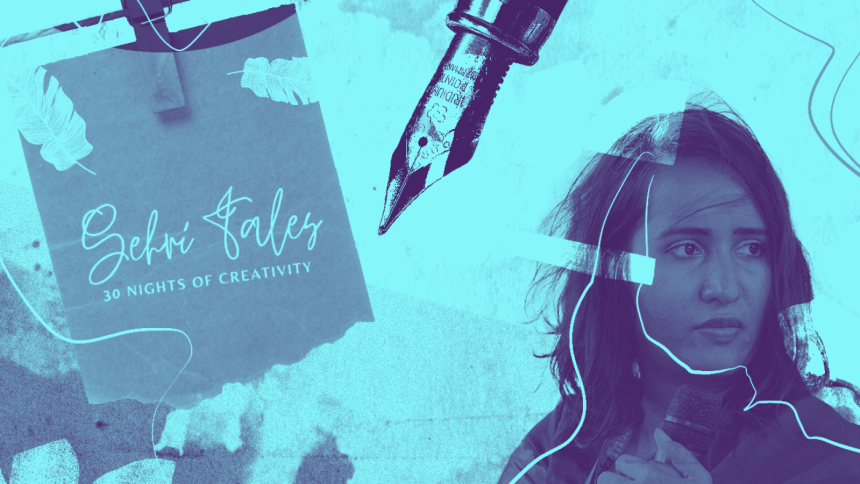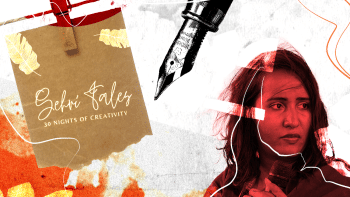The Sehri Tales prompt is a Rorschach test for participants

Although it was born from a longer family tradition, Sehri Tales came into my life as a surprise bit of salvation during a particularly dark period. What started off in 2016 as a Jungian approach to breaking a severe case of writer's block had the side effect of lifting me out of a deep fug of depression. The Ramadan of 2016, as many readers will remember, ended in tragedy with the Holey Artisan attack, which pushed us into an extended period of fear and uncertainty. The tail end of the first edition of the Sehri Tales also took on a documentary approach, because I was posting my real-time reactions to all the daily developments. While I never anticipated this self-challenge to snowball the way it has—something that still baffles me—the rapid evolution of the Tales in their very first month showed me the possibilities.
Fast forward half a decade, and the solo challenge has become a minor writing therapy phenomenon, for which, I am deeply indebted to my good friends Elita Karim and Lori Simpson, my tiny team of Talespeople mods, and of course, all our participants who spread the word to their friends. This growth has of course come with growing pains, and over the five years, I've come to make some interesting observations about the evolution of the challenge, and the trials and risks it poses to us, the moderators.
My first foray into opening up the challenge to a wider community began in 2018, when I signed up for a two-year collaboration with Litmosphere, which, at some 5000 members, was at that time the country's largest online book club. Drawing inspiration from the Nano Tales—a micro-fiction activity I had developed for The Daily Star's well-loved teen mag Rising Stars back in 2008—I set a word limit and introduced prompts as a starting-off point. Although the total number of participants gave us a very tiny sample size relative to our population, the sentiments expressed in the resulting tales echoed with a lot of what we were seeing around us. 2018 being bookended almost by the quota reform protests and the Road Safety Movement, was a turbulent year for Dhaka's youth. The word-association aspect of the prompts drew out some very emotional writing from the participants, stories of frustration and disenchantment with existing social mores.
In 2018, I was still working as a journalist, and the publication I was affiliated with was the title sponsor for the Dhaka Lit Fest. Working in close quarters with the literary community for such a hallmark event, I was witness to the growing unease regarding freedom of expression, as evidenced not only by the concerns regarding the same being raised by the visiting luminaries, but also the visible pushback from certain quarters against everything the three-day festival stood for. At the time, I didn't think it had much to do with my little writing challenge.
2020 brought with it a global pandemic and a country under lockdown. This was the year my stalwarts Tarin Fatema and Ariz Hoque convinced me to move the Sehri Tales challenge to my own platform. We pulled in our little firebrand Usraat Fahmidah and thus Talespeople was officially formed. The response was phenomenal. Forced into confinement by an invisible enemy, people were only too happy to welcome any kind of outlet for their frustration, and we saw participants writing in from around the world. Along with terrifying infection rates and a galloping daily death toll, Bangladesh saw an alarming rise in domestic violence and gory, graphic acts of sexual violence. These themes began to creep into the tales submitted by the growing pool of domestic writers.
This year marks a gradual return to normalcy. We have much to be thankful for; the infection rates and death toll has gone down, and traffic issues aside, the regular pace of life has resumed. As far as Sehri Tales is concerned, I'm happy to see the massive response in this milestone year. Throughout our biggest challenge year yet, we've received some truly stellar tales from both our newcomers and our stalwarts, covering a wide spectrum of styles, forms and themes. We saw more entries in Bangla, and some truly mind-blowing art, both in traditional and digital media.
If there is one thing that worries me a little, it is that the strong trend for themes of sexual violence that began to appear during lockdown, continues to be favoured by a significant number of our domestic writers. As I mentioned before, the Sehri Tales are based on a Jungian word-association template, intended to draw out the subconscious self. If a large number of our writers keep returning to the theme of sexual violence night after night, no matter what the prompt, it raises some concern about the state of society right now.
As the creator of Sehri Tales, I've tried to provide as much freedom of expression as possible within the time and word limits that frame the parameters of the challenge. With a responsibility towards maintaining a safe and inclusive environment for our community of Talers, however, this is the first time the mods and I have seriously begun to consider issues of censorship. This can be a slippery slope, and I hope ultimately this problem will go away on its own. So far, the Sehri Tales has always fought back against the darkness and ended in light. It is my fervent hope that the overwhelmingly supportive and wholesome community of Talers will prevail, and we'll chalk this up to that one short, but strange shadow in our history.
Sabrina Fatma Ahmad is an author, journalist, and owner of Sehri Tales, the annual creative writing challenge she founded in 2016.

 For all latest news, follow The Daily Star's Google News channel.
For all latest news, follow The Daily Star's Google News channel. 





Comments